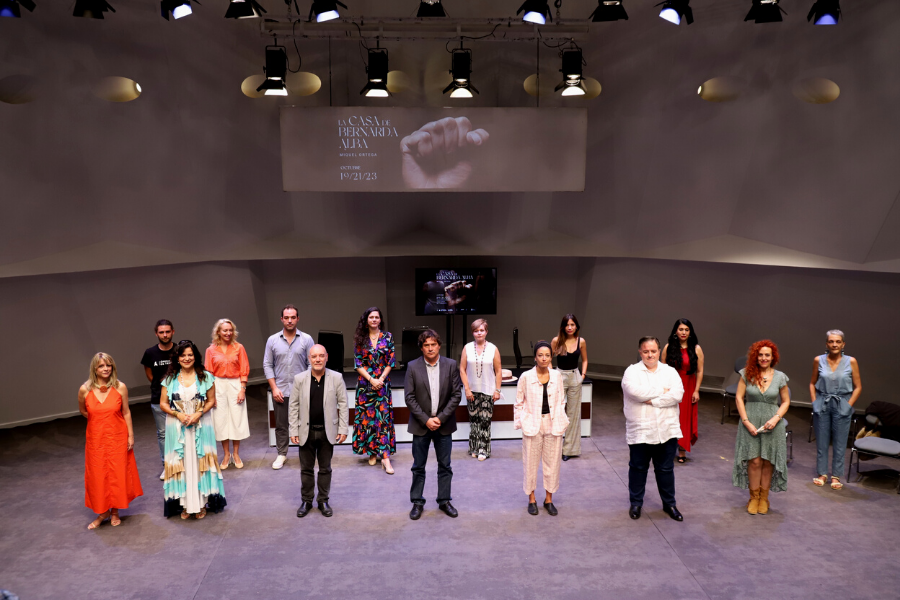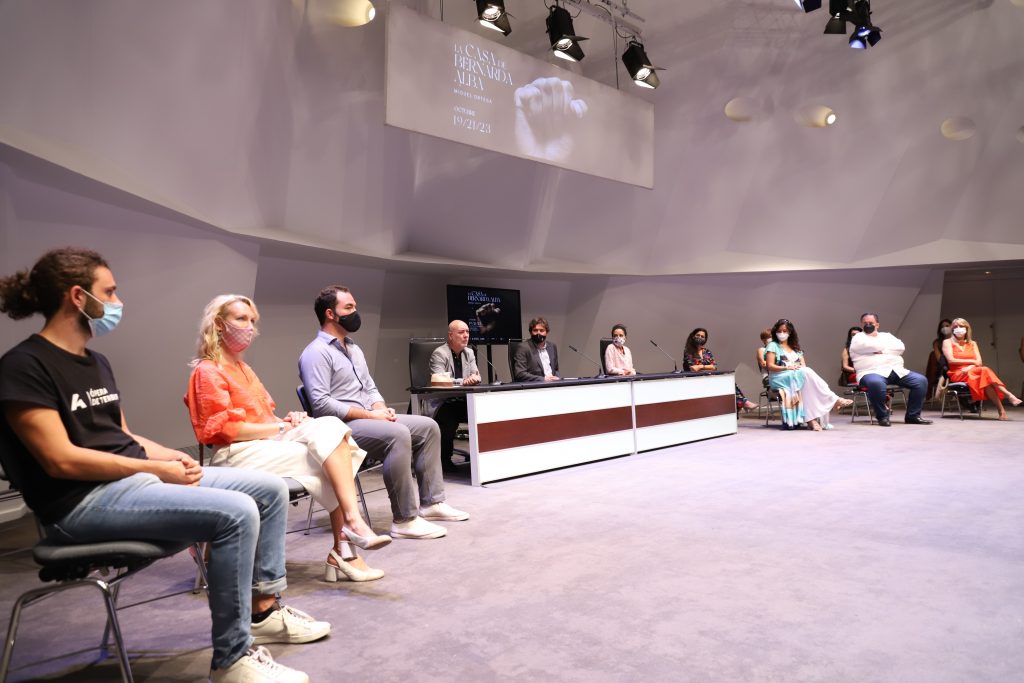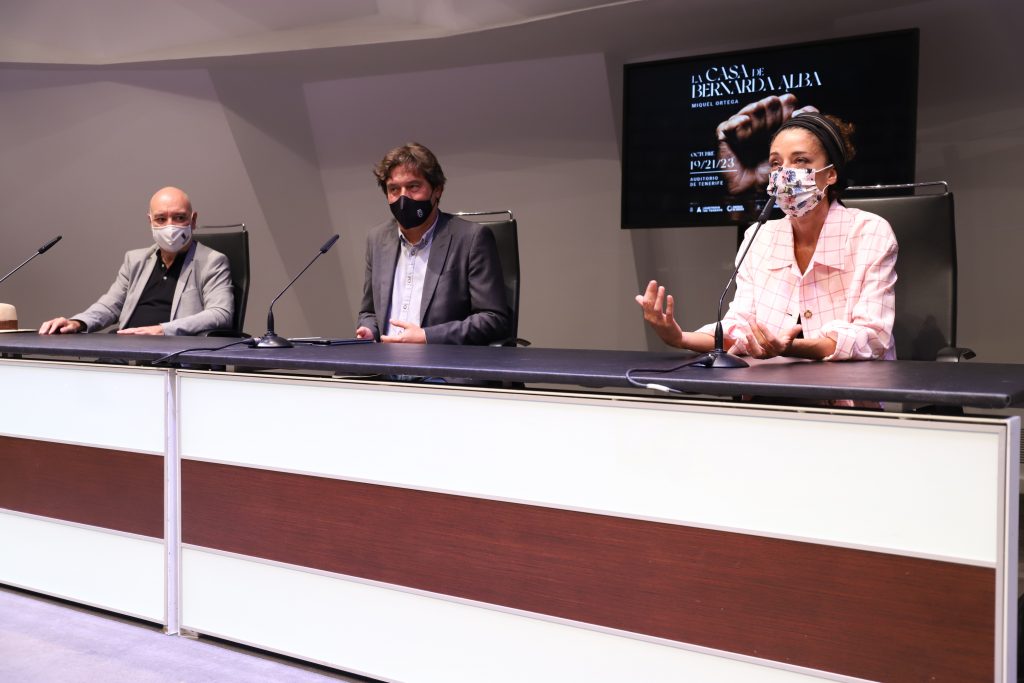Lorca llega al Auditorio de Tenerife con una producción propia de «La casa de Bernarda Alba»

El compositor de la ópera, Miquel Ortega, dirigirá a la Sinfónica de Tenerife, y la directora Silvia Paoli apuesta por un desierto rocoso.
El Auditorio de Tenerife, espacio que depende del área de Cultura del Cabildo, dirigida por el consejero Enrique Arriaga, abre la próxima semana la temporada 21-22 de Ópera de Tenerife con La casa de Bernarda Alba. Los próximos días 19, 21 y 23, a partir de las 19:30 horas, la directora de escena Silvia Paoli convertirá la Sala Sinfónica en un desierto rocoso para recibir esta ópera, inspirada en el drama homónimo de Federico García Lorca y compuesta por Miquel Ortega, quien dirigirá la Sinfónica de Tenerife. La presentación de esta nueva producción tuvo lugar el miércoles 13 de octubre con la asistencia del director insular de Cultura, Alejandro Krawietz; el compositor y director musical, Miquel Ortega; la directora de escena, Silvia Paoli, y los nueve cantantes que configuran el elenco.
Alejandro Krawietz aseguró que “es un placer abrir la temporada ofreciendo esta producción propia, que supone una apertura al ámbito contemporáneo de la ópera, trabajando, en este caso, en la tradición del verismo y abriendo nuevas ventanas a lenguajes líricos poco habituales”. “El año pasado fue difícil remontar la actividad operística y ahora, aunque la situación esté más relajada, sigue habiendo muchos protocolos y agradezco al equipo el esfuerzo e implicación para afrontar estos nuevos retos”, apuntó el director insular de Cultura.
Miquel Ortega reconoció que “es un placer volver a trabajar con la extraordinaria Orquesta Sinfónica de Tenerife y agradezco mucho a mi equipo musical el esfuerzo que está llevando a cabo”. El autor de esta obra lorquiana reconoce que “esta ópera no fue un encargo, la hice porque quise y porque desde joven me ha fascinado Lorca, así que supe que me costaría años terminarla”. En cuanto a la propuesta de Paoli, alabó su “belleza plástica, simbolismo lorquiano y semejanza con las grandes tragedias griegas”.
Silvia Paoli declaró que “esta puesta en escena no la hice simplemente por querer hacer algo diferente, sino porque es lo que siento, es mi manera de interpretar la obra del maestro Ortega y de Lorca”. La directora señaló que “es la primera vez que trabajo con un equipo compuesto totalmente por mujeres y creo que esto es lo que querría Lorca: representar a la mujer con mujeres”. En cuanto a su propuesta, destacó que “estamos en el siglo XXI, en el año 2021, no íbamos a hacer simplemente una casa porque creo que lo más importante en este momento histórico es representar los sentimientos, lo que hay dentro de esa casa”.
En representación de los cantantes intervino Nancy Fabiola Herrera, quien recomendó “a todos venir a la ópera para volver a vivir porque un espectáculo solo puede ser entendido en directo”. “Este elenco está trabajando en total sincronía y creo que debe ser así porque para representar a una familia disfuncional como la de Bernarda Alba sobre las tablas, debemos funcionar como una familia funcional detrás del escenario, y eso se ha conseguido en esta producción”. La mezzosoprano, que encarnará el rol de Bernarda, adelanta que “es una producción que te mantendrá en tensión desde el primer hasta el último minuto”.
Además de Herrera, este espectáculo contará con la soprano Carmen Acosta como Adela, Beatriz Lanza como Martirio, la mezzosoprano Marina Rodríguez-Cusí como Amelia, la también mezzo Belén Elvira como Magdalena (quien igualmente repite rol) y la soprano Melody Louledjian como Angustias. El barítono Luis Cansino volverá a ejecutar el papel de la ama de llaves Poncia, la soprano Carmen Mateo encarnará a una de las criadas y la actriz Marga Arnau será María Josefa, madre de Bernarda.
Tras largos años de trabajo, en 2006 quedó concluida la primera versión operística en castellano de esta pieza, que sería estrenada, en su versión sinfónica, en el Teatro Brasov de Rumanía el 13 de diciembre de 2007, para presentarse por primera vez en España en 2009, en los festivales de Santander y Perelada. La puesta de largo en el Teatro de la Zarzuela en 2018 ha significado un relanzamiento de esta ópera contemporánea, que ha pasado ya por el Teatro Cervantes de Málaga, donde cerró su XXXII temporada lírica en julio de 2021, y por el Teatro Villamarta de Jerez de la Frontera, donde abrió este mismo mes de octubre la temporada 2021-2022, como lo hace también en estos días en Ópera de Tenerife.
El poeta y dramaturgo Federico García Lorca no pudo ver representada su última obra dramática, La casa de Bernarda Alba, que concluyó en junio de 1936, dos meses antes de su asesinato. Todo, la vida y la representación, quedó interrumpido con la Guerra Civil y la muerte, y la obra tendría que esperar hasta 1945 para ser estrenada en el Teatro Avenida de Buenos Aires. Lorca describió su obra como “un drama de mujeres”.
Esta es la historia de varias mujeres prácticamente encarceladas por una madre autoritaria y dura, que las fuerza a seguir en plena juventud un luto riguroso durante ocho años por el fallecimiento de su segundo marido. El escritor utilizó este argumento para criticar la doble moral, la religiosidad asfixiante, la hipocresía, la violencia, el deseo reprimido, el control de la sexualidad femenina y la relegación de las mujeres a un plano secundario e insignificante.
Hasta el día 18 se puede adquirir el pack dos para martes, jueves o sábado de los dos primeros títulos de la temporada, La casa de Bernarda Alba y Attila (23, 25 y 27 de noviembre), con descuento del 20% y la posibilidad de sentarse en la misma butaca.
Las entradas se pueden adquirir hasta una hora antes del comienzo de cada función en la página web www.auditoriodetenerife.com y de forma telefónica en el 902 317 327 y en la taquilla de lunes a viernes de 10:00 a 17:00 horas y sábados de 10:00 a 14:00 horas. El usuario tendrá que elegir entre una o dos butacas prefijadas y distribuidas por la sala previamente. Se ruega al público llegar al recinto con antelación suficiente para hacer una entrada escalonada a la sala.
La compra de las entradas supone la aceptación de las medidas implementadas por el centro cultural del Cabildo para hacer frente a la COVID-19, como el uso correcto de la mascarilla o la asistencia solo con convivientes. Las medidas al completo, así como el plan de contingencia certificado por AENOR, se pueden consultar en la web del Auditorio.







